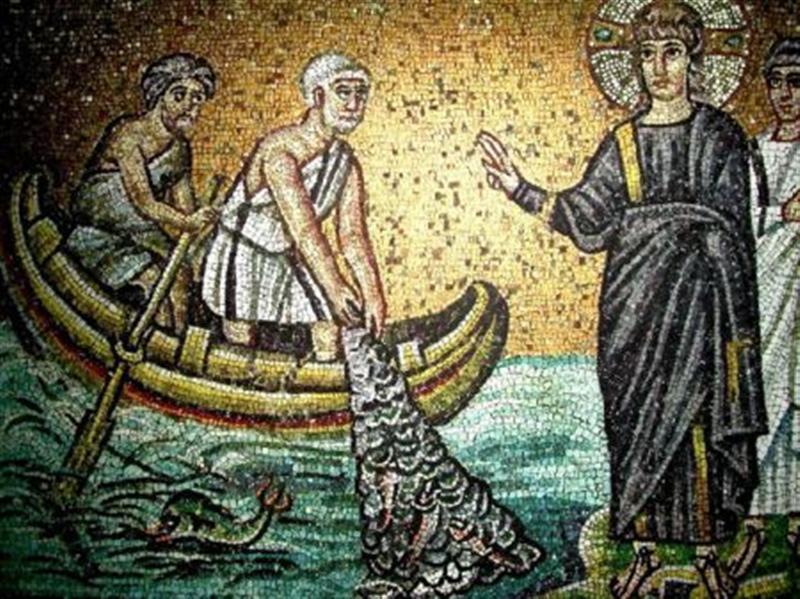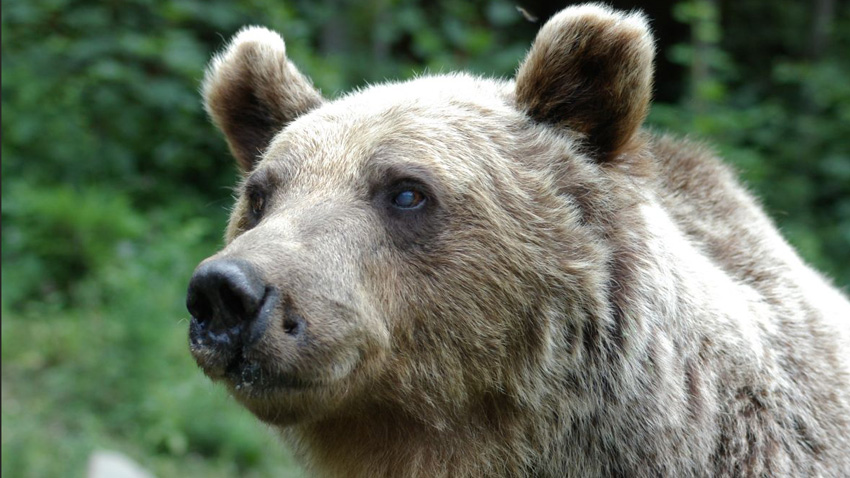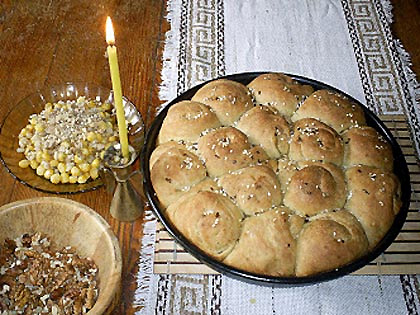In the middle of 1 c. AD, Saint Apostle Andrew (in Bulgarian Andrey) was the first to spread Christianity in the lands close to the Black Sea. Some of these lands later became part of the Bulgarian state. The Orthodox Church commemorates the apostle on 30 November. In the coming minutes we cast light on some Bulgarian traditions related to this feast and we play thematic folk songs as well.
 St. Apostle Andrew was the brother of St. Peter. He was also known as The First-Called, because he was the first among the apostles called to follow Christ. His passional reads thatfrom an early age he longed for the divine truth and when John the Baptist came from Judea he became one of his disciples. While one day Andrew stood on the banks of the river Jordan, St. John pointed to Jesus and said, “Behold the Lamb of God”. Hearing those words Andrew followed the Messiah, and spent the whole day with Him. The two brothers went on with their lives of fishermen. Later on Jesus saw them by the Sea of Galilee and told them: "Come, follow me and I will make you fishers of men". Since that moment they followed the Messiah everywhere and witnessed His miracles, death and resurrection. Most probably due to the fact that in his secular life St. Andrew was a fisherman, he is honoured on par with St. Nicholas in the towns and villages of Bulgaria's southern Black Sea coast. He was revered as a master of powerful sea gales and storms. In Southeastern Bulgaria St. Andrew is venerated as St. Nicholas's father.
St. Apostle Andrew was the brother of St. Peter. He was also known as The First-Called, because he was the first among the apostles called to follow Christ. His passional reads thatfrom an early age he longed for the divine truth and when John the Baptist came from Judea he became one of his disciples. While one day Andrew stood on the banks of the river Jordan, St. John pointed to Jesus and said, “Behold the Lamb of God”. Hearing those words Andrew followed the Messiah, and spent the whole day with Him. The two brothers went on with their lives of fishermen. Later on Jesus saw them by the Sea of Galilee and told them: "Come, follow me and I will make you fishers of men". Since that moment they followed the Messiah everywhere and witnessed His miracles, death and resurrection. Most probably due to the fact that in his secular life St. Andrew was a fisherman, he is honoured on par with St. Nicholas in the towns and villages of Bulgaria's southern Black Sea coast. He was revered as a master of powerful sea gales and storms. In Southeastern Bulgaria St. Andrew is venerated as St. Nicholas's father.
 In the Bulgarian tradition, the Feast of St. Andrewhas a host of names such as Andreevden (Andrew's Day), Andrey (just Andrew), Edrey (Grow Day) and Mechkinden (Bear's Day). And although it is based on a date in the Orthodox Christian calendar, the feast incorporates well preserved pagan rites and beliefs. According to a popular legend, one day the saint harnessed an ox in the plough and went ploughing his field. But then a bear came out of the woods and devoured the ox. St. Andrew was furious and began a fight with the naughty beast. Finally he harnessed the bear and finished the ploughing job. Another popular story describes St. Andrew as a hermit living in the woods. During his reclusion he tamed a bear.After long fasting he had to visit a monastery to take communion. And because the monastery was far away, the saint rode the bear and arrived to the holy place riding it. Before giving him communion the priest asked him what food he had consumed during fasting. St. Andrew replied he had eaten berries and milk. However, under the canon, milk is not allowed during fasting. So the father superior blamed the saint for having deviated from the vow, and said he himsel fhad eaten caviar. Then the hermit offered to wait for God's sign.Then St. Andrew put some milk in a bowl, and in another bowl -some caviar and covered them with a towel. He left them at the door oft he monastery overnight. In the morning the milk had turned into grass and the caviar into blood. So in the end, the saint received a blessing and the farther superior gave him communion.
In the Bulgarian tradition, the Feast of St. Andrewhas a host of names such as Andreevden (Andrew's Day), Andrey (just Andrew), Edrey (Grow Day) and Mechkinden (Bear's Day). And although it is based on a date in the Orthodox Christian calendar, the feast incorporates well preserved pagan rites and beliefs. According to a popular legend, one day the saint harnessed an ox in the plough and went ploughing his field. But then a bear came out of the woods and devoured the ox. St. Andrew was furious and began a fight with the naughty beast. Finally he harnessed the bear and finished the ploughing job. Another popular story describes St. Andrew as a hermit living in the woods. During his reclusion he tamed a bear.After long fasting he had to visit a monastery to take communion. And because the monastery was far away, the saint rode the bear and arrived to the holy place riding it. Before giving him communion the priest asked him what food he had consumed during fasting. St. Andrew replied he had eaten berries and milk. However, under the canon, milk is not allowed during fasting. So the father superior blamed the saint for having deviated from the vow, and said he himsel fhad eaten caviar. Then the hermit offered to wait for God's sign.Then St. Andrew put some milk in a bowl, and in another bowl -some caviar and covered them with a towel. He left them at the door oft he monastery overnight. In the morning the milk had turned into grass and the caviar into blood. So in the end, the saint received a blessing and the farther superior gave him communion.
 On St. Andrew's Feast the menu is focused on legumes. It is believed that starting on Andreevden, daytime begins to increase by a grain of millet every day. In popular legends on this day a bear would come out of the woods to look for food. Should it fail to find a special leguminous meal left for it, it would take a child away. To this day, Bulgarians boil grains such as barley, corn, wheat and beans as they prepare for St. Andrew's Feast. In some regions the following ritual was performed: grains were tossed up the chimney with the chant - here is boiled corn to you, bear, so that you won't devour livestock and humans! In traditional notions this would protect humans and the harvest from the dangerous beast and would bring fertility. Legumes were also given away to neighbours and relatives with the wish: Let seeds grow the way grains grow!
On St. Andrew's Feast the menu is focused on legumes. It is believed that starting on Andreevden, daytime begins to increase by a grain of millet every day. In popular legends on this day a bear would come out of the woods to look for food. Should it fail to find a special leguminous meal left for it, it would take a child away. To this day, Bulgarians boil grains such as barley, corn, wheat and beans as they prepare for St. Andrew's Feast. In some regions the following ritual was performed: grains were tossed up the chimney with the chant - here is boiled corn to you, bear, so that you won't devour livestock and humans! In traditional notions this would protect humans and the harvest from the dangerous beast and would bring fertility. Legumes were also given away to neighbours and relatives with the wish: Let seeds grow the way grains grow!
English Daniela Konstantinova
The Bulgarian village of Turia at the southern foothill of the Balkan Range is welcoming over a thousand participants in the Masquerade Games "Old Men in Turia". This year's edition of the festival on 30 March will feature 28 mummers' groups from all..
"In a vast region in northern Bulgaria, St. Todor is somehow perceived as a demonic character... He visited gatherings of unmarried girls, which were prohibited during that period; he acquired the appearance of a young bachelor, but distinguishable by..
Thousands of cowbells of different sizes and shapes filled the streets of Yambol with chiming, jingling and ringing at the 25th International Masquerade Festival "Kukerlandia". Згдшд More than two thousand mummers - called kukeri, sourvakari,..

+359 2 9336 661
